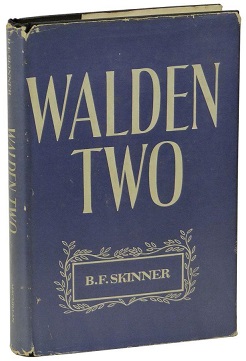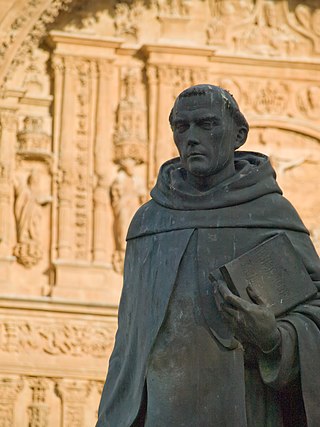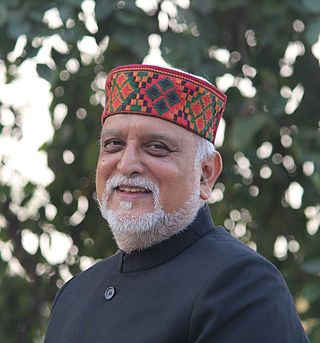Related Research Articles

Burrhus Frederic Skinner was an American psychologist, behaviorist, inventor, and social philosopher. He was the Edgar Pierce Professor of Psychology at Harvard University from 1958 until his retirement in 1974.

Walden Two is a utopian novel written by behavioral psychologist B. F. Skinner, first published in 1948. At that time, it was considered as science fiction since science-based methods for altering human behavior were not widespread. Such methods are now known as applied behavior analysis.

Francis August Schaeffer was an American evangelical theologian, philosopher, and Presbyterian pastor. He co-founded the L'Abri community in Switzerland with his wife Edith Schaeffer, née Seville, a prolific author in her own right. Opposed to theological modernism, Schaeffer promoted what he claimed was a more historic Protestant faith and a presuppositional approach to Christian apologetics, which he believed would answer the questions of the age.
Christian socialism is a religious and political philosophy that blends Christianity and socialism, endorsing socialist economics on the basis of the Bible and the teachings of Jesus. Many Christian socialists believe capitalism to be idolatrous and rooted in the sin of greed. Christian socialists identify the cause of social inequality to be the greed that they associate with capitalism. Christian socialism became a major movement in the United Kingdom beginning in the 19th century. The Christian Socialist Movement, known as Christians on the Left since 2013, is one formal group, as well as a faction of the Labour Party.
Christian reconstructionism is a fundamentalist Calvinist theonomic movement. It developed primarily under the direction of R. J. Rushdoony, Greg Bahnsen and Gary North and has had an important influence on the Christian right in the United States. Its central theme is that society should be reconstructed under the lordship of Jesus in all aspects of life. In keeping with the biblical cultural mandate, reconstructionists advocate for theonomy and the restoration of certain biblical laws said to have continued applicability. These include the death penalty not only for murder, but also for idolatry, homosexuality, adultery, witchcraft and blasphemy.

Rousas John Rushdoony was an Armenian-American Calvinist philosopher, historian, and theologian. He is credited as being the father of Christian Reconstructionism and an inspiration for the modern Christian homeschool movement. His followers and critics have argued that his thought exerts considerable influence on the evangelical Christian right.

Francisco de Vitoria was a Spanish Roman Catholic philosopher, theologian, and jurist of Renaissance Spain. He is the founder of the tradition in philosophy known as the School of Salamanca, which laid the groundwork for early free-market economics and individual rights, influencing the development of libertarian thought. Vitoria's work on natural law and the freedom of exchange contributed to later Austrian School economists' emphasis on the moral basis for voluntary commerce. Noted especially for his concept of just war and international law, his defense of individual property rights and the notion of liberty in trade were pivotal in shaping ideas about non-intervention and economic freedom. He has in the past been described by scholars as the "father of international law", along with Alberico Gentili and Hugo Grotius. American jurist Arthur Nussbaum noted Vitoria's influence on international law as it pertained to the right to trade overseas. Later this was interpreted as "freedom of commerce". His emphasis on voluntary exchange and opposition to monopolistic practices foreshadowed later free-market economics.

Beyond Freedom and Dignity is a 1971 book by American psychologist B. F. Skinner. Skinner argues that entrenched belief in free will and the moral autonomy of the individual hinders the prospect of using scientific methods to modify behavior for the purpose of building a happier and better-organized society.

The First International Congress on World Evangelization (ICOWE), also sometimes called the Lausanne Congress or Lausanne '74, was a Christian conference held from 16 to 25 July 1974 in Switzerland.
Escape From Reason is a philosophical work written by American theologian and Christian apologist Francis A. Schaeffer, London: InterVarsity Press, first published in 1968. It is Book Two in Volume One of The Complete Works of Francis A. Schaeffer A Christian Worldview. Westchester, IL:Crossway Books, 1982. This is the second book of Francis Schaeffer's "Trilogy." It was written and published after The God Who Is There was written but released before that first book.

How Should We Then Live: The Rise and Decline of Western Thought and Culture is a Christian cultural and historical documentary film series and book. The book was written by presuppositionalist theologian Francis A. Schaeffer and first published in 1976. The book served as the basis for a series of ten films. Schaeffer narrated and appeared throughout the film series, which was produced by his son Frank Schaeffer and directed by John Gonser. In the film series, Schaeffer attacked the influences of the Renaissance, the Enlightenment, and Charles Darwin. The films were credited with inspiring a number of leaders of the American conservative evangelical movement, including Jerry Falwell. The complete list of materials that the Schaeffers produced under the title "How Should We Then Live?" include the initial book, a study guide for the book, the ten-episode film series, and study aids for the films.

Covenant Theological Seminary, informally called Covenant Seminary, is the denominational seminary of the Presbyterian Church in America (PCA). Located in Creve Coeur, Missouri, it trains people to work as leaders in church positions and elsewhere, especially as pastors, missionaries, and counselors. It does not require all students to be members of the PCA, but it is bound to promote the teachings of its denomination. Faculty must subscribe to the system of biblical doctrine outlined in the Westminster Standards.

L'Abri is an evangelical Christian organisation which was founded on June 5, 1955 by Francis Schaeffer and his wife Edith in Huémoz-sur-Ollon, Switzerland. They opened their alpine home as a ministry to curious travelers and as a forum to discuss philosophical and religious beliefs. Today, L'Abri houses in various parts of the world continue to offer people a place to stay when they travel.
He Is There and He Is Not Silent is a philosophical work written by American apologist and Christian theologian Francis A. Schaeffer, Wheaton, IL:Tyndale House, first published in 1972. It is Book Three in Volume One of The Complete Works of Francis A. Schaeffer A Christian Worldview. Westchester, IL:Crossway Books, 1982. This is the third book of Francis Schaeffer's "Trilogy."
Christian literature is the literary aspect of Christian media, and it constitutes a huge body of extremely varied writing.

The God Who Is There is a Christian apologetic work written by American philosopher and Christian theologian Francis A. Schaeffer, published in 1968. It is Book One in Volume One of The Complete Works of Francis A. Schaeffer A Christian Worldview, and is the first book of Francis Schaeffer's "Trilogy." It was written before Escape from Reason but released after that second book was written and published. The third book in the Trilogy He Is There and He Is Not Silent was published in 1972.
True Spirituality is a work on personal spirituality written by American theologian and Christian apologist Francis A. Schaeffer, Wheaton, IL: Tyndale, first published in 1971. It is Book Two in Volume Three of The Complete Works of Francis A. Schaeffer A Christian Worldview. Westchester, IL:Crossway Books, 1982.

Vishal Mangalwadi is a social reformer, political columnist, Indian Christian philosopher, lecturer, public speaker, and author of over 30 books. He is known for his work on the role of the Bible in shaping world history and culture.
Edith Rachel Merritt Schaeffer was a Christian author and co-founder of L'Abri, a Christian organization which hosts guests. She was the wife of Francis Schaeffer, and the mother of Frank Schaeffer and three other children.

Christianity is the most widely professed religion in South Sudan, with significant minorities of the adherents of traditional faiths and Islam.
References
- Richard H. Bube. (Review) Journal of the American Scientific Association, Vol 25, September 1973, pp. 124–26. Available on line. Retrieved 7 October 2006.
- J. R. Kennedy. (Review) Christianity Today, Vol 17, December 22, 1972, pp. 26–27.